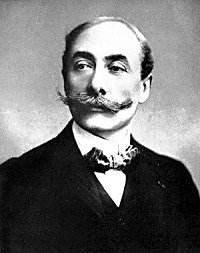
André Messager is mainly remembered for his delightful, tuneful
ballet music for The Two Pigeons. He was a renowned conductor
of his time as well as a composer. He conducted the premiere of Gustav
Charpentier’s Louise and Debussy’s Pelléas et Mélisande.
He was also Artistic Director of the Salle Favart (Opéra-Comique),
of Covent Garden in London, of the Palais Garnier (the Opéra),
director of the Société des Concerts du Conservatoire,
and fierce champion of Wagner and Richard Strauss. Messager’s Véronique
is considered to be one of the masterpieces of French operetta.
There are two big popular numbers that are instantly
recognisable in Véronique and they both come early on
in Act II: the "Donkey" duet, "Trot here and there …
dear little donkey…" and the "Swing" duet. They are sung
with verve by Michel Denis as Florestan and Mady Mesplé as Hélène
de Solanges. Hélène is masquerading as Véronique,
the florist's assistant, bent on correcting Florestan, her betrothed’s,
licentious behaviour. (In true operetta tradition, the couple had never
met. She has come up from the country to Paris to meet him only to find
not that not only does he risk imprisonment unless he marries a rich
heiress but that he has designs on the florist’s wife.)
The whole production is very jolly with lots of hummable
tunes in many styles: in waltz time, marches, a czardas etc. Lyric soprano,
Mady Mesplé is a delightful animated Hélène/Véronique
and Michel Dens a dashing and urbane Florestan. They are supported by
a splendid cast including Denise Benoit as Estelle/Ermance, Hélène’s
aunt and co-conspirator and Michel Dunand, nicely nonchalant as the
waggish Loustot in his song, "Quand j’étais baron des Merlettes".
This is an EMI France production and, I guess, a mid-price
reissue. As such the documentation is sparse. There is no libretto and
the synopsis is just about adequate. For this operetta there is an appreciable
amount of spoken dialogue. Those with limited French should be aware
of this but these sections are indicated in the track by track analysis
so they can be programmed out.
A delightful, sunny entertainment with lots of hummable
tunes, at least four of which are memorable, and two instantly recognisable.
Ian Lace
See also review by Raymond Walker
Further reading: "Operetta", Traubner (Oxford); ‘Musicals",
Ganzl (Carlton)


